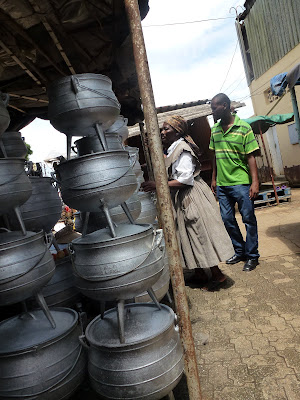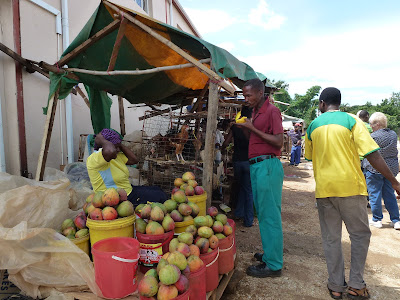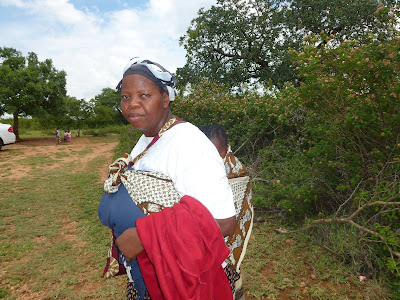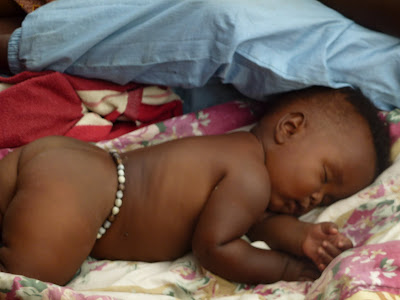 One of the missionaries serving here in South Africa is from Swaziland. His Aunt, the woman who raised him, is a "Sangoma" or medicine woman. He arrange for his brother to act as our guide and interpreter and asked him to introduce us to his family, especially his Aunt. He wanted us have a true cultural experience,the kind most outsiders never see and in a way most missionaries are unable to share.
One of the missionaries serving here in South Africa is from Swaziland. His Aunt, the woman who raised him, is a "Sangoma" or medicine woman. He arrange for his brother to act as our guide and interpreter and asked him to introduce us to his family, especially his Aunt. He wanted us have a true cultural experience,the kind most outsiders never see and in a way most missionaries are unable to share.Elder and Sister Lewis, serve as secretary and assistant to the Area Presidency here in South Africa. Sister Lewis had just processed 5 Mission Calls for young men in Swazi and wanted to hand delivery them so we drove together to Swaziland for an adventure with Ndumesol Shoba the younger brother of Elder Shoba. He was to be our guide.

 He informed us that one of the first thing we needed to do was to purchase some live chickens to take as a gift to the "Sangoma". She is an honoured woman in this culture and one must always take a gift. Chickens are considered a very good gift and he felt she would be very happy with them. We could have taken a bag of fruit, or some other thing but for the people here in Swazi chickens show a greater respect.
He informed us that one of the first thing we needed to do was to purchase some live chickens to take as a gift to the "Sangoma". She is an honoured woman in this culture and one must always take a gift. Chickens are considered a very good gift and he felt she would be very happy with them. We could have taken a bag of fruit, or some other thing but for the people here in Swazi chickens show a greater respect.So, off to the market we went in search of some very nice healthy looking chickens. We passed a number of other vender's along the way, all wanting us, and perhaps needing us to buy something from them. We did not really have a place to store anything additional so we tried to be nice and encourage them without buying things we would have to give away before we went back home.
It was fun and interesting to engage in conversations with these very nice hardworking people. Most of them are quite jolly even in the midst of poverty.


 We wandered through the market sharing with those whom we met our desire to find some healthy looking chicken and our need to stay focused on that goal for the present time. They accepted our search as reasonable and even pointed us in the right direction.
We wandered through the market sharing with those whom we met our desire to find some healthy looking chicken and our need to stay focused on that goal for the present time. They accepted our search as reasonable and even pointed us in the right direction.



 The gentleman in the green shirt is Ndumesol our guide for the day. He too is a member of our Church but he and his Elder brother are the only ones in their family.
The gentleman in the green shirt is Ndumesol our guide for the day. He too is a member of our Church but he and his Elder brother are the only ones in their family. Tradition in Swaziland says that a woman may keep the first and the last born of her children and the others she must give away to other extended family members.
That is how both Ndumesol and Elder Shoba came to be raised by their Aunt. They love their mother, but they love their Aunt as well.
Swaziland's social structure is based on a clan system and through marriage, these clans have intermingled. There is a class system which regulates marriage and with aristocracy the first wife is never the senior one and a second wife of higher status will take precedence. A preferential marriage arranged by the parents bestows a higher status on the union, forming a permanent bond between the two families. Ndumesol told us the name of the family is the most important thing. His Aunt married a Dlamini. That is the same line as the king. So it was an honour to be taken into their family even though he and his brother will never have the same status.
We wandered and wandered through the market meeting people and seeing the most interesting faces. This is a 3 generation family working in the market together. The daughter on the right, her mother on the left and the grand children. The grandmother was very formal and did not seem to be interested in some white woman's curiosity, but she tolerated me taking her pictures. I wished we could have understood each other. From the look of her face and expressions she did share through her daughter, she has seen a lot in her sojourn here on this earth.
Notice she has vivid blue eyes. Not something we see very often over here.
Finally we came upon the street where chickens are sold. Elder Webb and Elder and Sister Lewis checked out the chicken under Ndumesol's expert eye and looked for the nicest and largest chickens they could find.
The negotiations began. One thing we know for sure is that the price is higher for those of us who do not know how to negotiate the market. Ndumesol was no help with this project. We were pigeons looking for chickens. The long and the short of it is we paid about the same price we do for supermarket chickens in Johannesburg. We don't know if that is a good deal or not, but we were happy to find our prize and move on. The chicken vendors were delighted with the sale.





 This picture is of Elder Webb, Elder and Sister Lewis and Ndumesol; oh we mustn't take just any chickens.
This picture is of Elder Webb, Elder and Sister Lewis and Ndumesol; oh we mustn't take just any chickens.












 We took much longer than we expected with the chicken purchase. Some things one just can't rush. Besides it is a pleasure just to visit with people along the way. The children love having their pictures taken and they giggle with glee when they are shown what they look like.
We took much longer than we expected with the chicken purchase. Some things one just can't rush. Besides it is a pleasure just to visit with people along the way. The children love having their pictures taken and they giggle with glee when they are shown what they look like.

 Finally on the road again. We came upon this truck. Several small children road in the open air reminiscent of tailgate rides of days gone by; except these people drive 60 with the kids bouncing around in the back. Seat belt? What are seat belts?
Finally on the road again. We came upon this truck. Several small children road in the open air reminiscent of tailgate rides of days gone by; except these people drive 60 with the kids bouncing around in the back. Seat belt? What are seat belts?Little did we know our adventure would take us all day. We drove and drove and drove. Most of the time on dirt roads that were not even grated. The landscape was lovely; we drove further and further into remote areas heading for Ndumesol's homestead and were greet by animals grazing on the sides of the road.
For some reason they do not graze the animals in fenced pastures. They simply let them wander where they will. Generally there are children playing with in eye distance who have the job of herding them home at the appropriate time.
The following picture are taken from the car window as we maneuvered down paths and over pastures. There were fenced and gated areas. When we came to a gate, actually it was just wire stretched across the path, children would run over and pull it back for us so we could pass through. There were 5 such crossings before we reached Ndumesol Aunt's home.
Continue to scroll down form more pictures and text.
The water we drove through was not too deep but it was enough to hamper our driving somewhat. It didn't seem to bother the animals at all though. They grazed around it and waded through it to grass greener on the other side of the road.
These pictures are from Ndumesol's family homestead. The children are relatives and they know and love him. They ran to greet us and to see what me might have for them to eat. We had apples and cookies enough to share. We gave them each a coin as well.
This woman was walking from somewhere. I don't know where she had been because there is nothing for miles and miles yet it looked like she carried a bag from a store. The main highway is at least 10 miles down this cleared road way (of sorts). It was so warm and she was so bundled up with blankets and capes that her baby was wet with prespiration. She walked without complaint and the little one was sound asleep. She had no water and as near as I could tell, had no diapers or supplies for the baby. These people just make do and are very gracious as they make their way.
These lovely ladies greeted us from the tree tops when we stopped our car to take pictures of Ndumesol and one of his brothers in from of their parents property.


 This little one greeted us along with the older children. There were no adults around, just children doing what children do; playing and keeping an eye on the animals. We were visiting on Saturday morning so none of the children had school.
This little one greeted us along with the older children. There were no adults around, just children doing what children do; playing and keeping an eye on the animals. We were visiting on Saturday morning so none of the children had school.





This is Ndumesol and his youngest brother. Remember, the oldest and the youngest sons stay home with the mother's family all other children are gifted out to other members of the family. Some are treated well, others are treated like servants.
Goat will eat anything and these animals are no exception. Take a look at the spikes on the tree they are eating. It is said that these are the kind of branched that were used to make the crown of thorns that was made for Christ.
As you can see they are harsh. The animals simply eat around the thorns. It's hard to imagine but giraffes will eat around the thorns as well.
We finally arrived at Ndumesol's Aunt's homestead after another hour's drive. Our chickens had survived the trunk ride for over 2 hours of hot bumpy weather and roads.
This one was so happy to be out of the car he didn't wait to be set free to scratch and peck he went right for the dirt.
Traditional healers are regarded as physicians, prophetes, priests, diviners and herbalists, and about 80% of the people consult these practitioners, who are mostely male. The " Inyanga", as they are known, inherit their skills form their fathers and grandfathers and they hold a senior place in the society. The function of divination involves throwing bones and interpreting the patterns into which they fall.
The " Sangoma" is a tradtional diviner who has been called to the professions. Generally women, they are consulted to alleviate physical and mental problems, attend various ceremonies and act as counsellors. When divining, the sangoma tradionally relies on the spirit of possession.
Ndumesol's aunt is kind of inbetween these two professions. She does do potions and herbs as well as throw the bones and shells to devine what is ailing a person. Because we brought her the chickens she gave us a demonstrations of her normal work.
While she was changing into her medicine woman atire we met the rest of the family.
Her son, is now the head of the homestead. He had three wives. The first one died. The second one, a lovely woman sat next to her hut making a plum cordial for the adults in the family. She gathered the wild plums in a bucket and then, using a knife removed the flesh of the fruit into a bowl. She said she would then press it through a cloth to get the juice and remove the meat of the fruit. She would then let it set for several days to furment in the heat of the day. It take about 5 days to get a good foam on it which indicates it is ready to be consumed.
She sits on the ground like this for hours culling and pressing the plum juice and then was able to get up and move around like she had never been sitting on the ground straight backe and cross legged. She would lean forward from the waist to get more fruit from the bucket. She remaind cheerful as she worked and visited with her baby sleeping soundly by her side.
The other children would join her for a little chat and then run off to play. We are told that each child has a roll to play and a job to do in order for things to run smoothly. The boys are taught by the father, the responsibilities of the men and the girls are taught by the mother the responsibilities of the women. This seemed to be the way this home stead was run.
I don't know which wife these children belong to, but there is only one wife, the one we see in this picture at the far left, that lives on this property. The third wife lives at a different location. These older girls may be children from another family who have been sent here to help. The father only talked of three children that were his. They were all younger. These girls helped with the baby when he woke.
Notice the beaded belt the baby wears. It is to keep track of his growth pattern. They increase the number of seeds in the belt and some how that is how they know he is heatly and strong and growing in a healthy way. He wears no diapers and already the mother know when he needs to releave himself and takes the right precautions.
He sleeps so peacefully dispite the noise and commotions around him.
He is a beautiful baby and I loved holding him.
This homestead was very large and had many acres of land all planted in corn.
That is pretty much all they grow and all they eat unless they find wild fruit like the plums they would enjoy. Occasionally they would have a chicken and on special occasions they would roast a goat. There is no garden other than the fields of corn. There is a mill down the same lane they live on several miles back. That is where they take the dried corn to grind it into meal, and flour.
This homestead has several buildings three of which are for the Medicine woman. One is the studio where she works and does her potions. One is her sleeping quarters and one is where she reads her bones and shells.
We were informed that the witch doctor, or "Sangoma" was ready for us and would give us a demonstration of her services. We were invited to sit on mats and she was to honour us with a dance. We were quite surprised when she made herself know. We found ourself having a National Geographic moment. We were a little uncomfortable because this is was all new to us and we were not quite sure how to act. But everything was truly authentic and just the way she looks when she does her work. She is very comfortable and confident and was very kind to show us a piece of true African tradition. You will see in the next picture that the doctor works topless. You may way to edit picture before showing them to family, or you may decide to share a bit of the culture. In any event we were entertain by family on the drums and the Aunt giving us a demonstration of her medcine dance.
She was very gracious and graceful as well. I don't know how old she is but I would say she is in her fifties. The average age expectancy in Swaziland is 36 I believe. That is because of the aids problem here. This family seems unaffected by the terrible disease at least for now.
Some of the members of the families of church members have died of aids. Some members are infected, having discovered the church after being infected. That is because the church is relatively young here and many of the members are first generation.
Tirhani, the women with whom I work has lost every member of her family to aids. Her last brother died this past year.
The remainder of the picture are of members of this homestead. I hope you enjoy them as much as we enjoyed the visit we had with them. They were beautiful gracious people. They are not members of our church but they are very religious. They do not believe in Jesus Christ but do believe in God and seem to be very caring of one another. They are so remote they have little or no contact with others. They father stays on the property to manage it and he does not let his wife leave. The older girls go to school at the end of their road. They walk several miles a day going to and from school. But, at least for the moment that is as much as they see of this world we live in. They loved having us visit. We left them with banana chips and apples which they children loved.
No comments:
Post a Comment